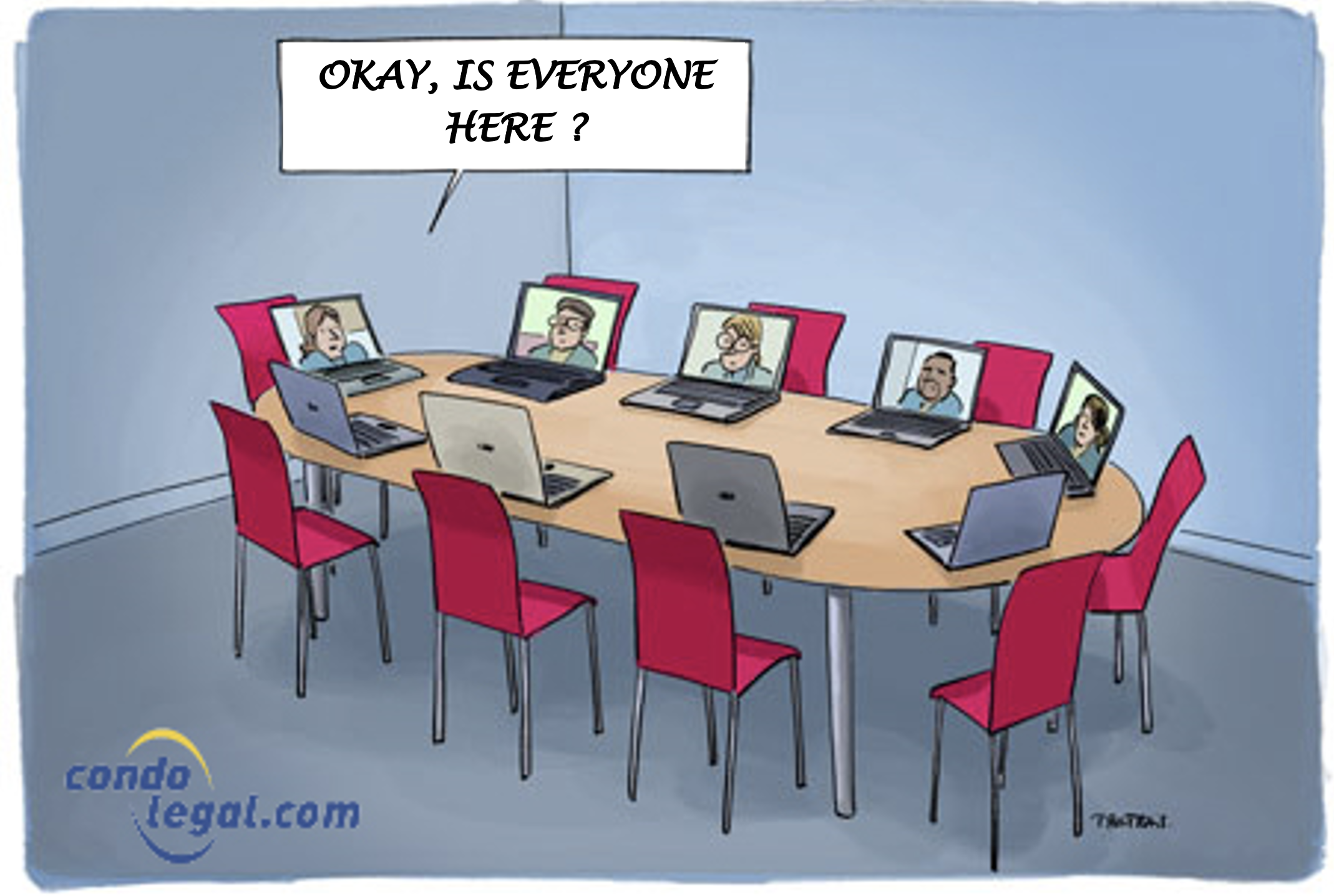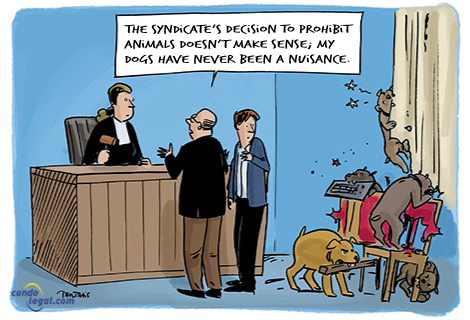
The COVID-19 health crisis and its procession of government restrictions to limit gatherings have often made it impossible to regroup. The legislator was forced to organize the rescue of legal persons, banned from assemblies, to preserve, at least for a time, their functioning. The syndicates of co-owners have thus adopted alternatives to face-to-face meetings of co-owners. Social distancing obliges, COVID-19 has given rise to a phenomenon in co-ownership: virtual meetings of co-owners, also called remote meetings.
In order to perpetuate this way of doing things, the law now authorizes syndicates of co-owners to hold meetings by technological means.
Ministerial order
On April 26, 2020, Ministerial Order 2020-029 made "virtual" meetings possible, that is to say without any presence, physical and in particular through a screen. This new form for holding meetings of co-owners has won many followers by its logistical simplicity and efficiency. Thus, representations were made by the Regroupement des gestionnaires et copropriétaires du Québec to the government in order to maintain this means, which initially was to be allowed only for the duration of the health emergency.
Bill 103
As of December 7, 2021, the government acquiesced to the representations made by introducing, via Bill 103,the possibility of holding meetings of co-owners as well as meetings of the board of directors virtually. This bill came into force on December 9, 2021.
The Civil Code of Québec was amended by inserting the following articles :
1084.1. The directors may participate in a meeting of the board of directors by the use of a means which allows all those participating to communicate directly with each other.
Directors who participate in such a meeting may vote by any means enabling votes to be cast in a way that allows them to be verified afterwards and protects the secrecy of the vote when such a ballot has been requested.
1088.1. A meeting may be held by the use of a means which allows all those participating to communicate directly with each other.
1089.1. Co-owners who participate in a meeting by the use of a means which allows all those participating to communicate directly with each other may vote by any means enabling votes to be cast in a way that allows them to be verified afterwards and protects the secrecy of the vote when such a ballot has been requested.
This amendment will not only make it possible to hold meetings or meetings virtually during the period of health emergency but also after it, under the conditions provided for in the Civil Code of Québec. It should be noted that these meetings do not necessarily have to be held in this way, they can continue to be held face-to-face or in a hybrid way, thus allowing greater participation of the co-owners.
Holding of the virtual meeting of co-owners
The conditions for holding a virtual meeting have three components:
Technological modalities
A meeting of co-owners or a virtual board meeting uses exclusively online technology, without requiring the physical presence of anyone in the same place. They can also take place in hybrid mode, i.e. virtually and in person at the same time. In order to be valid, the technology must also allow "all members to communicate immediately with each other." The computer tool chosen must also allow participants to:
Vote (by secret ballot)
In order to ensure the discretion of the votes, a secret ballot could be requested by the president of the meeting, or by any co-owner present or represented. Unlike show of hands and split calls, the secret ballot must be provided for each resolution by means of a ballot paper. This allows each of the co-owners to vote in favour of a resolution, to oppose it or to abstain. If a secret ballot is required, the president of the assembly must guarantee, as far as possible, the confidentiality of the data transmitted to him.
That said, a ballot must necessarily indicate the number of votes associated with the fraction of the co-owner, so that its secret nature could be compromised. The word confidential is more appropriate in co-ownership. In fact, we must be able to count on the discretion of the scrutineers of the assembly, its leaders and the union. Where a secret ballot is held, article 1089.1 of the Civil Code of Quebec provides that the technological means used may preserve the secret nature of the vote when such a vote is requested. The same applies to meetings of the board of directors under article 1084.1 of the Civil Code of Quebec.
Data retention
The law provides that the technology used may be used to collect votes in such a way as to allow subsequent verification. For this reason, the electronic voting system must at least demonstrate that:
Thus, all support files (copies of the source and executable codes of the programs and the underlying system, voting materials, registration files, results, backups) must be kept under seal at least until the expiry of the period of contestation (90 days) of the resolutions adopted, before their destruction.
Other rules applicable to the holding of virtual meetings
The process that leads to the convening of a general meeting of co-owners must be scrupulously observed. It is necessary to respect certain conditions of form and deadline, under the law and the declaration of co-ownership, otherwise the decisions taken during this meeting could be invalidated.
Platform settings
The meeting or meeting platform of the board of directors must ensure that the objectives sought by the Act can be met. Participants must be able to join the virtual assembly via a desktop, laptop, smartphone, tablet or landline. Although there is no specific rule in this matter, co-owners should receive (before the meeting):
Thus, a participant only logs in with their custom code. The platform must therefore block double connections.
Platform Specifications
When it comes to a meeting of co-owners, the chosen platform simultaneously processes several operations in multitasking mode. It must:
Notice of Meeting
The participants in a meeting of co-owners are informed by means of a notice of meeting. The written notice must:
Generally, the declaration of co-ownership specifies how to send a notice of meeting. If it is silent on this issue, the law does not impose any specific requirements. However, for the holding of a meeting to comply with the rules, the directors of a co-ownership must convene all the co-owners, which is why it is advisable to opt for the safest possible means of transmission. Thus, the sending of a convocation by registered mail or email (if the declaration of co-ownership does not prohibit it) is one of the choices to be retained. In all cases, the syndicate will have to prove that it has summoned all the co-owners, for example by means of a duly signed acknowledgment of receipt.
Documents to be transmitted
The notice of meeting must always be accompanied by an agenda, as well as various documents that the co-owners must read, in order to participate in the meeting with full knowledge of the facts. The requirements of article 1087 of the Civil Code of Quebec and those contained in the declaration of co-ownership still apply.
Transmission of the notice of meeting and technological means
The method of transmission of the notice of convocation to the co-owners is not subject to any law. Rather, it is the declaration of co-ownership that imposes certain requirements. The oldest may require sending by registered mail, hand delivery or other. However, in times of pandemic, hand delivery is prohibited for obvious reasons.
 WHAT YOU SHOULD KNOW! The registration of the attendance sheet is not required for "remote" participants, but it must be certified accurate by the president of the meeting of co-owners. It may be held in electronic form.
WHAT YOU SHOULD KNOW! The registration of the attendance sheet is not required for "remote" participants, but it must be certified accurate by the president of the meeting of co-owners. It may be held in electronic form.
 WHAT TO KEEP IN MIND: The notice of meeting may be sent by email to certain co-owners who have provided a valid address, or by other means to co-owners who do not have the technologies to receive it.
WHAT TO KEEP IN MIND: The notice of meeting may be sent by email to certain co-owners who have provided a valid address, or by other means to co-owners who do not have the technologies to receive it.
 WARNING! If technical incidents have prevented a co-owner who has used videoconferencing, audioconferencing or any other means of electronic communication from making his vote known, these must be mentioned in the minutes on a register specially opened for this purpose.
WARNING! If technical incidents have prevented a co-owner who has used videoconferencing, audioconferencing or any other means of electronic communication from making his vote known, these must be mentioned in the minutes on a register specially opened for this purpose.






